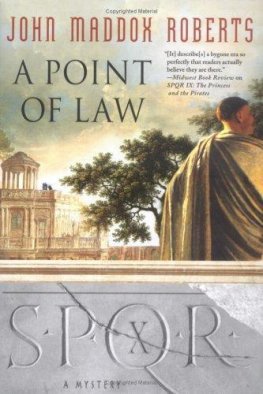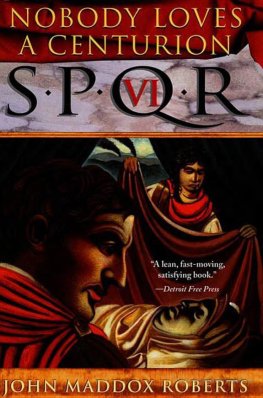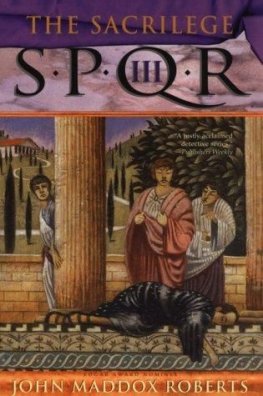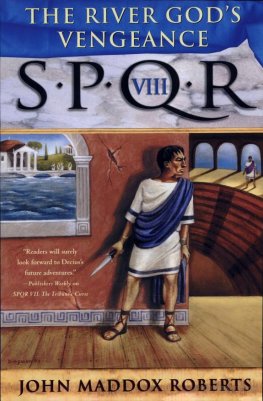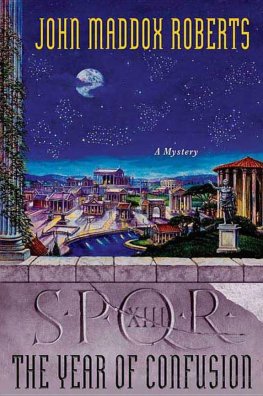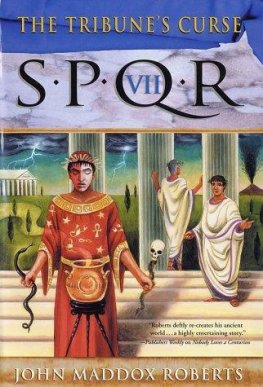John Roberts - A Point of Law
Here you can read online John Roberts - A Point of Law full text of the book (entire story) in english for free. Download pdf and epub, get meaning, cover and reviews about this ebook. year: 0101, publisher: St. Martin, genre: Detective and thriller. Description of the work, (preface) as well as reviews are available. Best literature library LitArk.com created for fans of good reading and offers a wide selection of genres:
Romance novel
Science fiction
Adventure
Detective
Science
History
Home and family
Prose
Art
Politics
Computer
Non-fiction
Religion
Business
Children
Humor
Choose a favorite category and find really read worthwhile books. Enjoy immersion in the world of imagination, feel the emotions of the characters or learn something new for yourself, make an fascinating discovery.
- Book:A Point of Law
- Author:
- Publisher:St. Martin
- Genre:
- Year:0101
- ISBN:9780312337254
- Rating:4 / 5
- Favourites:Add to favourites
- Your mark:
- 80
- 1
- 2
- 3
- 4
- 5
A Point of Law: summary, description and annotation
We offer to read an annotation, description, summary or preface (depends on what the author of the book "A Point of Law" wrote himself). If you haven't found the necessary information about the book — write in the comments, we will try to find it.
A Point of Law — read online for free the complete book (whole text) full work
Below is the text of the book, divided by pages. System saving the place of the last page read, allows you to conveniently read the book "A Point of Law" online for free, without having to search again every time where you left off. Put a bookmark, and you can go to the page where you finished reading at any time.
Font size:
Interval:
Bookmark:
John Maddox Roberts
A Point of Law
1
Rome at election time! Can there be any prospect more pleasant? Is it possible for any place to be more wonderful? For any activity to be more agreeable? Certainly not for me, and not that year. I was just back from Cyprus after a successful, mildly glorious, and none-too-bloody campaign to suppress a recent outburst of piracy. I had found their base, destroyed their fleet, and, best of all, captured a good part of their loot. The captives I had returned to their homes and had restored a part of the loot to the people from whom it had been stolen.
Luckily for me, a great deal of the loot had been impossible to trace, so it belonged to me. I had split up some of it with my men, made a handsome donation to the Treasury, and with the rest had cleared my considerable debts. I now had reached the proper age and had accumulated the requisite military experience to stand for the office of praetor. Perhaps best of all, I was a Caecilia Metella, and the men of my family expected automatic election to the higher offices by right of birth.
To top it all off, the weather was beautiful. It seemed that all the gods of Rome were on my side. As usual, the gods were about to play one of their infamous jokes on me.
The morning it all began I was at the Porticus Metelli on the Campus Martius, across from the Circus Flaminius, presiding over the consecration of my monument. This porticus, a handsome rectangle of colonnades surrounding a fine courtyard, had been erected by my family for the convenience of the people and to our own glory, and we paid for its upkeep. Some of my pirate loot had bought it a new roof. A monument in the Forum might have been more prestigious, but by that time the Forum was already so cluttered with monuments that one more would not have been noticeable. Besides, mine was not very large.
But in those days the City was spilling outside its old walls and the formerly rustic Campus Martius, the assembly place and drill ground for the legions of old, was now a prosperous suburb, growing full of expensive businesses and fine houses. And my monument wasnt just a statue, it was a naval trophy: a pillar studded with the bronze rams of the ships I had captured.
Actually, the pirate ships had had small, unimpressive rams, since pirates usually tried to board rather than sink ships, and mostly they raided shore villages so their ships had to be able to beach and escape quickly: not an easy task when you have a large ram sticking out in front. So I had had big, fearsome-looking rams cast, one for each pirate ship. Atop the pillar was a statue of Neptune, raising his trident in victory. A little grandiose for a campaign against scummy pirates, but that year all the real military glory was Caesars so I took what I could get.
I was dressed in my toga candida, specially whitened with fullers earth, to announce my candidacy for the praetorship. This surprised nobody. My friends and clients applauded as the trophy was unveiled and priests of Bellona and Neptune pronounced the consecration. They were both relatives of mine and glad to help out. Quintus Hortensius Hortalus, my fathers old friend, now grown old and portly, took the auguries and pronounced them favorable in his incomparable voice.
Many of Romes dignitaries were there. Pompey was there to offer his congratulations, as was the tiresome Cato. I would have liked to have Cicero in attendance, but he and his brother were off in Syria putting down a Parthian incursion. My wife, Julia, and many of her relations attended, providing perhaps an excessively large Caesarian contingent. Far too many people already considered me to be one of Caesars flunkies. My good friend Titus Milo could not attend as he was in exile for killing Clodius and had not long to live, although I could not know that at the time.
Still, the morning was glorious, the monument was fine, my future was bright. At last I would hold an office of real power instead of one with endless responsibilities and duties and costing a fortune to support. I would have imperium and would be attended by lictors. With luck, when I left office I would be given a province to govern, one that was at peace, where I could get rich in relative safety. Most politicians wanted a province at war where they could win glory and loot, but I knew that any such position would put me in competition with Caesar and Pompey. I knew far too much of both men to want any part of that.
My father, ailing and leaning on a cane, had managed to attend. He swore hed live to see me elected consul, but I feared he would never make it that long. Indeed, it depressed me to look at the knot of my senior kinsmen who accompanied him. All the great Metelli were dead or too elderly for political significance. Dalmaticus and Numidicus had died with my grandfathers generation, the generation of Marius. My fathers generation had included Metellus Celer, now dead; Creticus, there that day but also growing old and very stout; Metellus Scipio, a pontifex, a Caecilian by adoption; and Nepos, closer to me in age but Pompeys man, and Pompey was a has-been if only his supporters would realize it. They had all been Sullas supporters, and Sulla had been dead for more than twenty-five years. The Metelli of my own generation were still numerous, but they were political nonentities. I included myself in this category.
Also beside me was my freedman Hermes, still uncomfortable in his citizens toga, a garment to which he had been entitled for only a few months. Of course, for official purposes his name was Decius Caecilius Metellus, but that was for his tombstone. He elected to keep his slave name, even though it was Greek. Well, it was a gods name after all, and many citizens of my generation went by Greek nicknames, some of which were quite indecent and for which there were no Latin equivalents.
With the dedication ceremony done, we all trooped to the Forum, past the temples of Apollo and Bellona, through the Carmentalis Gate in the old wall, around the base of the Capitol, and into the northwestern end of the great assembly place. It was even more thronged than usual, with the elections coming up and everyone who counted for anything in from the country. It was the season for parties and politics, for intrigue, bribery, and coercion.
At this time most of the Senate had split into two factions: pro-Caesarian and anti-Caesarian. Caesar was overwhelmingly popular with the plebs at Rome and hated violently by a large part of the aristocratic faction. As usual, such polarization led to strange juxtapositions. Men who, a few years previously, had reserved their greatest scorn for Pompey, now courted him as the only viable rival to Caesar. Theirs was a short-sighted policy, but desperate men will grasp at anything that promises respite from the thing they fear. I tried to keep my distance from all such factions, but my family connections made that difficult. One of the years consuls, Marcus Claudius Marcellus, was among the most rabid of the anti-Caesarians and had not attended my little unveiling ceremony. The other consul, Sulpicius Rufus, congratulated me ostentatiously. Such were the times.
Doing the usual round of meeting and greeting, we made a leisurely progress toward the foot of the Capitol, near the old meeting place of the comitia, where all the years candidates were accustomed to congregate, stand around, preen, and generally proclaim their willingness to serve Senate and People. Here our friends and well-wishers would drop by, take our hands, and trumpet loudly to anyone who would listen what splendid fellows we all were. It was one of our less dignified customs and a constant source of amazement to foreigners, but wed always done it that way and that was a good enough reason to continue.
As a candidate for an office with imperium, it was my first order of business to greet the candidates I was supporting for the junior offices in order to take each by the hand and tell everyone what a splendid fellow he was.
Font size:
Interval:
Bookmark:
Similar books «A Point of Law»
Look at similar books to A Point of Law. We have selected literature similar in name and meaning in the hope of providing readers with more options to find new, interesting, not yet read works.
Discussion, reviews of the book A Point of Law and just readers' own opinions. Leave your comments, write what you think about the work, its meaning or the main characters. Specify what exactly you liked and what you didn't like, and why you think so.

